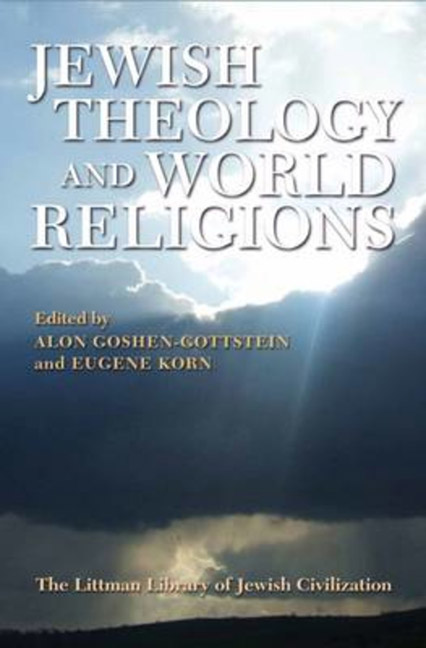Book contents
- Frontmatter
- Dedication
- Preface
- Contents
- Note on Transliteration
- Towards a Jewish Theology of World Religions: Framing the Issues
- PART I PHILOSOPHICAL PERSPECTIVES ON JEWISH PLURALISM
- PART II JUDAISM AND THE OTHER
- 5 Can Another Religion Be Seen as the Other?
- 6 The Violence of the Neutral in Interfaith Relations
- 7 Jewish Liturgical Memory and the Non-Jew: Past Realities and Future Possibilities
- PART III JUDAISM AND WORLD RELIGIONS
- Concluding Reflections
- Notes on the Contributors
- Index
5 - Can Another Religion Be Seen as the Other?
from PART II - JUDAISM AND THE OTHER
- Frontmatter
- Dedication
- Preface
- Contents
- Note on Transliteration
- Towards a Jewish Theology of World Religions: Framing the Issues
- PART I PHILOSOPHICAL PERSPECTIVES ON JEWISH PLURALISM
- PART II JUDAISM AND THE OTHER
- 5 Can Another Religion Be Seen as the Other?
- 6 The Violence of the Neutral in Interfaith Relations
- 7 Jewish Liturgical Memory and the Non-Jew: Past Realities and Future Possibilities
- PART III JUDAISM AND WORLD RELIGIONS
- Concluding Reflections
- Notes on the Contributors
- Index
Summary
THE OTHER
WHO IS the Other? A basic understanding of the term ‘other’ is shared by the man in the street and the philosopher: the other is an individual human being. But the philosopher sometimes uses a capital ‘O’: the Other. The typographical modification is used to express an important idea: the Other is so fundamentally important, so basic an ingredient of the world, so unique, and so inexhaustibly deep that the Otherness of a human person is of a different quality than the otherness of things, and it opens a specific dimension of being.
While this Otherness is a philosophical notion, it has a theological flavour. Indeed, I think it is equally a theological concept. After all, the idea of the uniqueness of another person is close to the concept of the soul and to the vision of being created in God's image.
With that Otherness in mind, the basic question within the framework of interfaith dialogue is whether the other religion can be perceived as having a similar dimension of otherness, one that deserves the capital ‘O’. The experience with the concepts of philosophers of dialogue such as Martin Buber, Franz Rosenzweig, Emmanuel Levinas, and of those in the phenomenological, hermeneutical, existentialist traditions suggests at least this: if the naive view of another person has proved to be an introduction to deeper insights, perhaps the same may be the case with religions. We can ask, therefore: ‘Can we reach beyond the naive view of the other religion?’This chapter offers comments on possible attitudes to other religions, suggested by insights derived from both modern philosophy and Jewish tradition.
THE PLURAL ‘YOU’
One way of using the philosophy of the Other as an inspiration for the shaping of the vision of other religions is to transfer discoveries from the realm of individual persons to the realm of religions. Whatever religions are—and this is far from clear—it is certain that they entail understanding individuals as belonging to a supra-individual entity. When we direct our attention to another religion we encounter not only individuals but also a group. Facing a religion, we both face a person and relate to a group. Hence the idea of transferring the insights used to describe the other individual, the Thou, to the plural other, the You.
- Type
- Chapter
- Information
- Jewish Theology and World Religions , pp. 137 - 148Publisher: Liverpool University PressPrint publication year: 2012



